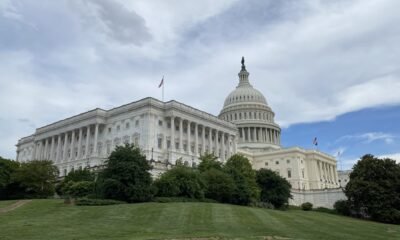DC Bureau
Trump’s Challenge: The Fight to Ban Trans Athletes from School Sports and the Roadblocks Ahead

In a significant development for transgender rights in Arizona, the state’s legislature, alongside then-Governor Doug Ducey, enacted a law in 2022 that restricts participation in interscholastic sports based on a narrow definition of gender. This legislation effectively barred transgender student-athletes from competing on teams that align with their gender identity across all educational levels.
Since July 2023, however, the enforcement of this law has been halted by a temporary injunction issued by the courts. The injunction followed a lawsuit filed by two transgender student-athletes, who argued that the law infringes upon protections guaranteed under federal laws, including the Equal Protection Clause of the Fourteenth Amendment and Title IX, which prohibits sex-based discrimination.
Opposition to the injunction came from prominent Republican figures, including Arizona Superintendent of Public Instruction Tom Horne, Senate President Warren Petersen, and House Speaker Ben Toma. They contended that allowing transgender girls to compete with cisgender girls would negatively affect the latter’s sports experience. Despite these claims, the 9th Circuit Court of Appeals upheld the lower court’s decision, maintaining the pause on the law as the legal battle continues.
On a broader scale, President-elect Donald Trump has expressed intentions to pursue a ban on transgender youth participating in sports that align with their gender identity once he assumes office. Experts and advocates suggest that implementing such a ban will be fraught with delays and legal resistance from LGBTQ+ organizations.
Trump’s prior campaign promises emphasize a desire to restrict transgender athletes from competing according to their gender identity, reflecting his administration’s anti-trans stance. As states increasingly enact similar laws, the ramifications of these moves could ignite substantial legal challenges.
In response to these developments, the Biden administration had previously updated Title IX regulations to bolster protections for LGBTQ+ students, although specific criteria addressing transgender athletes were not finalized. Trump has declared plans to reverse these regulations on day one of his administration, a move that would entail a lengthy and legally complex process due to the Administrative Procedure Act (APA).
Experts caution that, while the Trump administration may seek to dismantle existing protections, the procedural nature of the APA demands adherence to specific guidelines, making immediate change unlikely. Furthermore, legal challenges from advocacy groups are anticipated, emphasizing the contentious nature of the issue.
Recent discourse has underscored the increasing polarization surrounding transgender rights in sports. More than 25 states have enacted laws prohibiting transgender athletes from competing in accordance with their gender identity, with experts indicating that such measures often serve as a foundation for further anti-trans legislation.
Logan Casey, director of policy research at the Movement Advancement Project, noted the rapid proliferation of these laws, suggesting that they are typically the first step in broader attacks on transgender rights. The manufactured controversies surrounding trans participation in sports serve to galvanize support for anti-LGBTQ policies, raising significant concerns moving forward.
This ongoing legal and political battle will shape the landscape of transgender rights across the United States, particularly as the new administration prepares to take action.
Last updated 10:45 a.m., Dec. 20, 2024


















